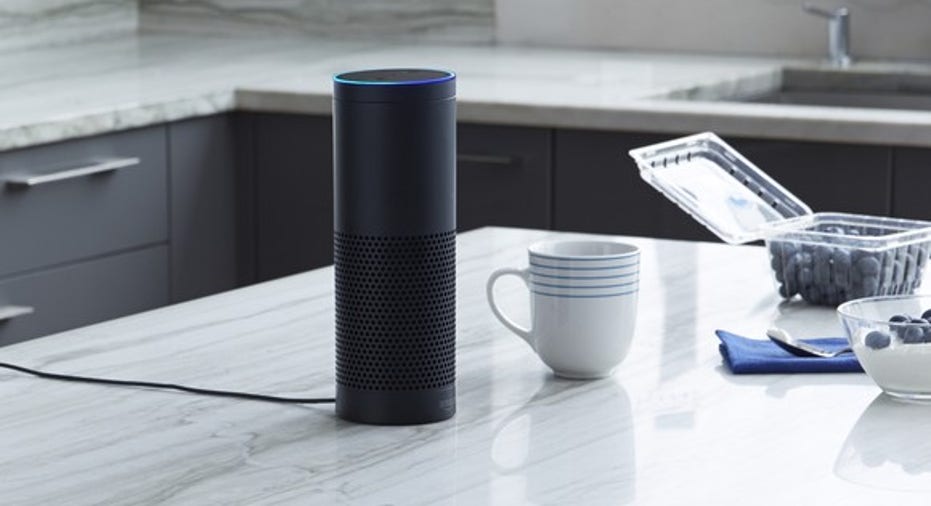When Will Amazon.com Split Its Stock Again?

Echo. Image source: Amazon.com.
At upwards of $760, Amazon.com's (NASDAQ: AMZN) stock is, at least on a nominal basis, quite expensive. Few companies boast share prices much higher.
Two factors have driven Amazon's share price to such tremendous heights: its phenomenal run of business success, and its management's unwillingness to split its stock. Yes,Amazon has split its stock in the past -- three times, in fact -- but the last time it did so was nearly 17 years ago, back when it was a relatively small internet retailer, generally regarded as a bookseller and not much else.
On paper, stock splits mean little: A single share cleaved in two (or more) still represents the same percentage of the company. But a stock that's too expensive can have some real consequences.
To be clear, Amazon's management hasn't promised to split its stock, or even hinted at the possibility. Still, I think it's likely that Amazon will undertake its fourth stock split at some point in the near future.
The advantages of a stock split
Splitting Amazon's stock would give the company two advantages: First, it would allow for more retail investors to participate. Second, it would help facilitate Amazon's addition to the Dow Jones Industrial Average.
Given Amazon's current share price, many retail investors may scoff at the prospect of buying Amazon stock. To some extent, this may be psychological: Some investors simply prefer to outfit their portfolio with more shares of less expensive stocks, for whatever reason. But there's also a practical application: Buying a single share of Amazon would commit a modest portfolio to significant exposure. One share of Amazon would represent nearly 8% of a brokerage account worth $10,000, for example.
When Apple (NASDAQ: AAPL) split its stock in 2014, it cited a desire to expand its base of shareholders. "We want Apple stock to be more accessible to a larger number of investors," it said.
Since then, Apple shares have risen about 15%, outperforming the broader market. It's not clear how much it's 7-for-1 split contributed, but by making it easier for retail investors to participate, Apple may have increased the demand for its stock. At the same time, Apple remains primarily a seller of consumer electronics -- retail investors with shares of Apple in their portfolio may be more likely to choose an iPhone when it comes time to purchase a smartphone.
Certainly, Apple's 7-for-1 split was a necessary prerequisite to joining the Dow. The famous index is price-weighted, meaning that any one component's relative contribution is driven by the nominal price of its stock. On average, Dow stocks trade for around $50 to $100 per share -- a $760 stock would have an undue influence on the index.
With the exception of its share price, Amazon fulfills all the criteria necessary to become a Dow Jones component. Few would argue that the company doesn't have an excellent reputation or that it isn't of interest to a large number of investors. Certainly, it's demonstrated sustained growth.
Becoming America's top retailer
The Dow Jones has contained some of America's most successful retailers -- Sears Roebuck was a longtime member, as was Woolworth's. Today, Wal-Martand Home Depot are the Dow's retailing members.
By market cap, Amazon is now America's largest retailer, and seemingly the most significant. Wal-Mart's recent $3 billion purchase of Jet.com suggests the future of retail is online, a space Amazon unquestionably dominates.
Barring a drastic downturn in its business, look for Amazon to split its stock sometime in the next few years. An 8-for-1 split would clear the way for the company's enshrinement in the Dow Jones -- an affirmation of its status as the country's dominant retailer.
A secret billion-dollar stock opportunity The world's biggest tech company forgot to show you something, but a few Wall Street analysts and the Fool didn't miss a beat: There's a small company that's powering their brand-new gadgets and the coming revolution in technology. And we think its stock price has nearly unlimited room to run for early in-the-know investors! To be one of them, just click here.
Sam Mattera has no position in any stocks mentioned. The Motley Fool owns shares of and recommends Amazon.com and Apple. The Motley Fool has the following options: long January 2018 $90 calls on Apple and short January 2018 $95 calls on Apple. Try any of our Foolish newsletter services free for 30 days. We Fools may not all hold the same opinions, but we all believe that considering a diverse range of insights makes us better investors. The Motley Fool has a disclosure policy.



















